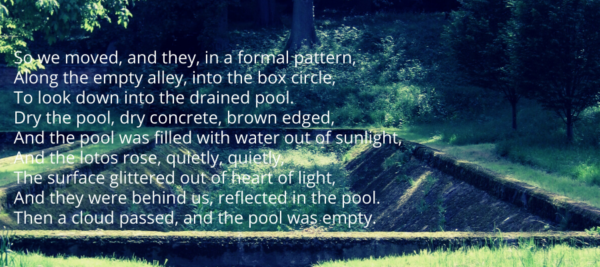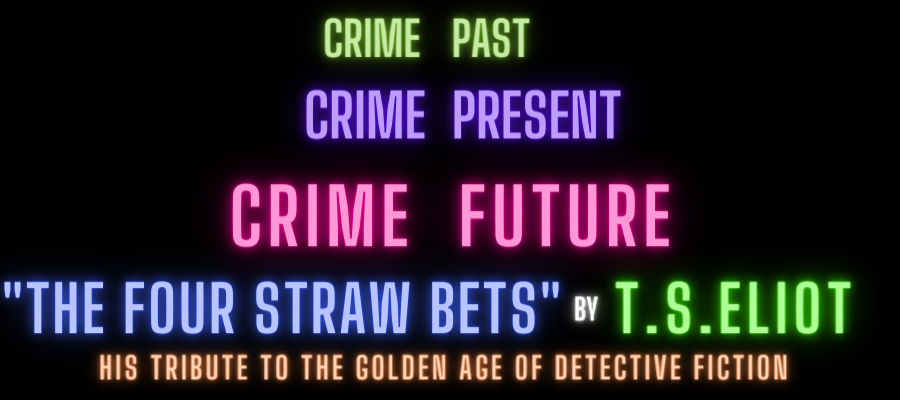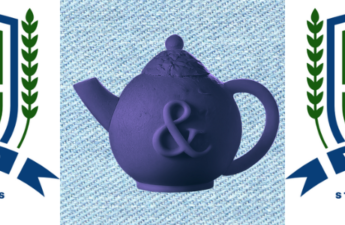Many people know that the poet T. S. Eliot was very fond of cats and indeed created some wonderful cat characters and wrote poems about them. Many people also know that he loved practical jokes – things like exploding cigars and farting cushions. They may also know that he was a fan of detective fiction and wrote reviews for The Criterion – the literary magazine he founded and edited.
Less well known is the fact that there are two versions of his last major work – The Four Straw Bets, the first of which – Learnt Shorten was first published in 1936. In Learnt Shorten, Eliot introduces the primary theme of his masterwork – a deep and meditative reflection on crime and eternity.
This is how it begins:
Crime present and crime past
Are both perhaps present in crime future,
And crime future contained in crime past.
If all crime is eternally present
All crime is inconceivable.
What might have been is a distraction
Remaining a perpetual mutability
Only in a furled of fluctuation.
What might have been and what has been
Point to one bend, which is always present.
Boot-heels echo in the reverie
Down the message which we did not take
Towards the drawer we never opened
Into the clothes-pardon.
As is so clear from these opening lines, Eliot picks up some of the themes from his earlier work. There is the touch of Wasteland paranoia in the echo of the boot heels (remember by this time Mussolini and Hitler were already goosestepping their way into Africa and Spain so no doubt Eliot was very aware of the remilitarization of Italy and Germany.) But instead of Prufrock’s overwhelming question, it is the mystery of unsolved and eternal crime that preoccupies the poet.
Crime is viewed as inconceivable and problematic, whereas eternity is beautiful and true. Living under crime’s influence is a problem. Within Learnt Shorton section 3, people trapped in crime between innocence and guilt are similar to those stuck in between life and death.
And what of the title? What is the significance of Straw Bets and Learnt Shorten? The reason for the former becomes apparent in the fourth Bet which is called, significantly, Little – or sometimes Brittle – Bidding.
The whole of the work presents Eliot’s wager between crime and eternity. He was influenced by his friend and fellow poet Alexander McShorten who, for several years in the late 1920s, had a significant position in the Metropolitan Police. When he and Eliot had dinner they would frequently discuss the crime of the day and their views on crime real and crime fiction. (Eliot developed some rather strict rules for the latter.)
When the two men had a significant falling out in late 1935, Eliot felt he had learned all he could about Scotland Yard and modern detective work. Hence his title. It was a rather public snub of his old friend and one that McShorten felt keenly. Years after his death, his widow – Flora McShorten – wrote bitterly about the pain of that broken friendship and what she called Eliot’s “bitter and callous betrayal”.
Learnt Shorten moves on to the description of a crime scene – the first of many in the work. Here we are drawn into Eliot’s nightmarish world:
My birds echo
Thus, in your blind.
But to what surplus
Disturbing the crust on a shoal of nose-thieves
I do not know.
Other geckos
Inhabit the pardon. Shall we follow?
And follow we must because the poet has woven his spell and we must follow.
Quick, said the third, find them, find them,
Round the horner. Through the first plate,
Into our first furled, shall we follow
The reception of the crush? Into our first furled.
There they were, dignified, invisible,
Moving without Cheshire, over the dead thieves,
In the autumn wheat, through the vibrant lair,
And the third called, in ensconse to
The unheard mew sick hidden in the rubbery,
And the unseen sky stream crossed, for the noses
Had the look of towers that are looked at.
There they were as our jests, accepted and accepting.
So we moved, and they, in a formal slattern,
Along the empty valley, into the box fir skull,
To look down into the drained spool.
Dry the spool, dry secrete, brown edged,
And the spool was filled with sorter out of eyesight,
And the photos rose, quietly, quietly,
The cur place glittered out of art of slight,
And they were behind us, reflected in the spool.
Then a crowd passed, and the spool was empty.
Go, said the third, for the thieves were full of chilled rum,
Hidden excitedly, containing after.
And nightmarish it is too, the scene of this first crime where nothing is as it seems. The spool – like the tomb – is empty! Who has moved the body? And why? Who chilled the rum? And who is behind us?
And so we come to the end of Part 1 of the first Straw Bet. All very OuLiPo.
As usual, Eliot teases us with more clues, more mysterious voices (who is the Third?) that lead us down the garden path to that latest bend in the twists and turns of his plot.
Go, go, go, said the Third: human dined
Cannot bear very much inanity.
Crime past and crime future
What might have been and what has been
Point to one bend, which is always present.
Do you agree?



Do Eliot scholars have a sense of humour?
If so they will love this.
I am not a scholar. But I did!
Thank-you.
I don’t know about the “scholars” but Eliot certainly had a sense of humour. Apparently he was a big fan of the whoopee cushion variety.
And you could say he crushed a stink bomb into the middle of the Georgians when it came to poetics.
I loved the adaptation and the critical comments that accompanied it. As a many times reader of the originals, I especially love how it morphed under your pen.
Thank you for this most generous comment on what is basically a whole load of old cobblers!
We grew up with this
Dark, dark, datk…they all go into the dark
Might explain something
Yes. A particularly grim section from “Beast Choke Her” and not usually verse deemed suitable for children, focussing as it does here on running naked with the feral dogs.
O bark bark bark! They all go totally stark,
The vacant interstellar places, the fey-can’t into the vacant,
The wrapped-ins, merchant wankers, eminent den of debtors,
The generous matrons of tart, the weightsmen and the droolers,
Distinguished sieve observants, airmen of many bombed cities,
Industrial bauds and petty stage actors, all go totally stark, ….
And now I’m wondering whether Eliot was familiar with Edna St. Vincent Millay’s, “Dirge Without Music”
Down, down, down into the darkness of the grave
Gently they go, the beautiful, the tender, the kind;
Quietly they go, the intelligent, the witty, the brave.
I know. But I do not approve. And I am not resigned.
You’re on a roll, Josie. I don’t think you could stop now no matter how hard you tried.
This is unfortunately true. I have just had to tear myself away from almost completing the whole four Straw Bets. I find it a most enjoyable form of close reading and infinitely amusing. But that’s just me. I’ve also been onto John Ashbery but as you can imagine it would be hard for most people to tell. So easy to write nonsense. So hard to write anything but.
I agree with you about John Ashbery. I always find him quite obscure. I guess for this to work the poems need to be fairly recognisable There is always Tennyson.
P S That comment posted itself before I had edited Sorry Josie. Can you edit (or delete) As you see fit
I did edit. But I always rather like the oddities of the unintended. The serendipity of the unexpected. And of course, I have some zher gut Ztennyson lined up.
On either stride the giver lie
Long wealds of Charlie and of pie,
That clothe the bold and meet the thigh;
And thro’ the weald the mode runs by
To many-shower’d Spamalot
Thank you Josie.
Tennyson almost too easy for you. Love Spamalot (although have vague memories of an animation of that name??)
Yes in terms of Spamalot. The Monty Python crew got there ahead of me. But it was a tight race. As far as I know, they have not started on In Memoriam.
You can hear him reading the original here. Quick, said the third – who wanted some more chilled rum.
To quote James Cagney (playing George M. Cohen) in YANKEE DOODLE DANDY: “My mother thanks you, my father thanks you, my sister thanks you, and I thank you”….and I might add, Groucho Marx thanks you (I beg your readers’ “pardon” for the ‘inside joke’).
All nose-pardons accepted:
https://www.tcm.com/video/1076251/yankee-doodle-dandy-1942-my-father-thanks-you
So this fits perfectly. They say that Eliot wanted to title “The Wasteland” “He do the police in many voices” after that character who read the crime reports out loud in “Our Mutual Friend”. And here he old Possum doing the crime in many voices. Seems right to me.